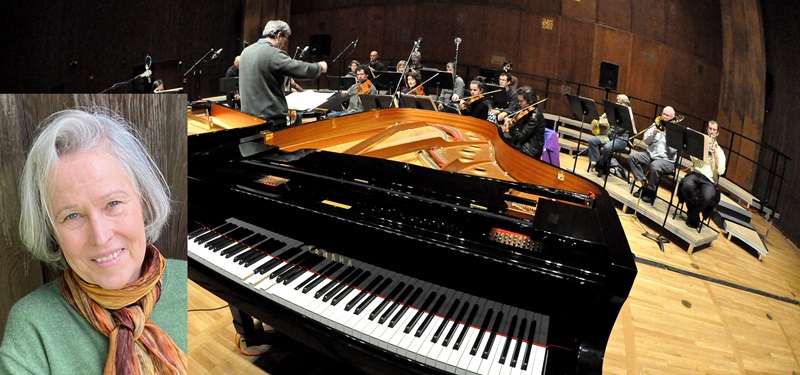
IT ISN’T JUST YOUR OLD BALL GAME
BERKELEY—Dramatize the ancient Mayan saga, and do so at your own risk.
The intrepid and ageless faculty composer Cindy Cox is a risk-taker, creating a dazzling oratorio-like version of the epic Mayan myth “Popol Vuh,” a generous concert portion of which was unveiled at Hertz Hall by the Eco Ensemble Feb. 3. It’s an animist story of man versus the evil forces of the Lords of Death that threaten to wipe out every one. This could well be the oldest New World epic in the surviving literature. It was set down by Fr. Ximénez, from Indians’ oral recitations of the creation myth three centuries ago in what became Guatemala. Since the Mayan Empire dates back to B.C., this saga might now be more than two millennia old.
Cox’s opus is an arresting and highly important one, both as musical adventure and ethno-musicological keepsake, leading to hopes of the entire work presented, chorus, dancers and all.
Cox’ artful distillation entitled “The Road to Xibalba” tells of the fetching woman Little Blood (lyric soprano Amy Foote, partly in soaring vocalise) and her grown twins Xbalanque and Hunahpu artfully deceiving the Lords, who had demanded a skull as proof of death, by subbing a magical fruit. Overhanging the drama was the threat of the twins being forced into the fearful Mayan ballgames, in which the losing team as we know is routinely put to death. And Xibalba represents the underworld, hopelessly removed from the glorious world of the Mayan Empire. The road to Xibalba is literally a dead end.
To avert a curse, perhaps we’d need no less than a shaman to sound incantations over a cactus fire, with the odor of peyote or mescaline in the air.
This dramatization is a task not casually undertaken. Composer Allen Strange had brought out his version with act two of his “Popol Vuh” stage work in a San Jose workshop three decades ago, and Mexican-Americans in the production were offended, citing these as sacred, secret texts.
I don’t know if it was cursed. But Opera San Jose abruptly withdrew from the project, and Strange’s “Popol Vuh” was relegated to the back burner, unfinished. Admiring Cox’s audacity, I fervently hope that her work can avoid similar shelving, as it is an absorbing, high-quality effort, as shown by a 10-piece orchestra with robust percussion, four singers, and narrator.
In addition, Cox gave a major role to two percussionists, recreating sound textures reminiscent of early Central America. Gregory Messa and Garrett Mendelow played up a storm with their high-electricity duet, all but sending drumsticks flying through the ceiling. She had added also her own Belize field recordings of wildlife—birds, howler monkeys, bugs and rain too—but, in this concert, at times almost inaudible. In addition, there are contemporary multiphonics, with wind instruments simultaneously producing dissimilar sounds.
At the other extreme came the legato quartet of vocal soloists, soothing and smoothing the waters. Less effective was the narration (by John Campion, Cox’s husband), a device, as in Stravinsky’s “Oedipus Rex,” that tends merely to bring action to various stop signs. Cox’s musical style is readily assimilated by a wide audience while still injecting the drama lurking in the dire Xibalba threat. The humans’ triumph in their struggle against the Lords was assisted by a magical squash, an owl, and a ruse that saves the twins.
A bit over a half-hour in length, the concert excerpt featured fellow faculty member David Milnes conducting with hands and fists (but no baton)….Three other amiable chamber works by Cox were also included….When presented in complete form, Cox’s stage work will add to the growing repertoire of modern south-of-the-border musical theater such as the Gabriela Frank opera “The Final Dream of Frida (Kahlo) and Diego (Rivera).”
MUSIC NOTES—“Popol Vuh” is a sacred foundational narrative of the Kʼicheʼ people including the Mayan creation myth….The Eco Ensemble at UC Berkeley is a blend of student and professional performers….Professor Cox has served the music faculty for three decades, part of it as department chair.
COX’S “THE ROAD TO XIBALBA” excerpts in concert version in an all-Cox program of Feb. 3 at Hertz Hall, UC Berkeley. For info on Cal Performances: (510) 642-9988, or online, www.calperformances.org